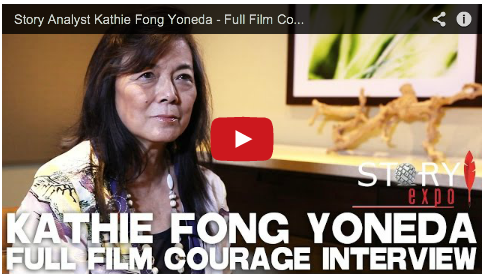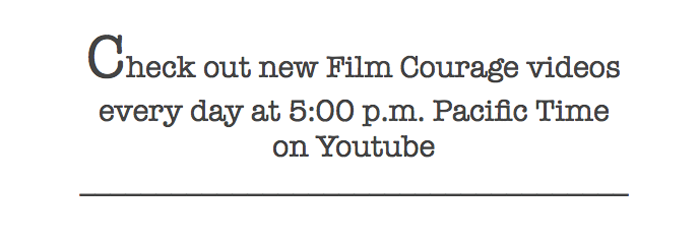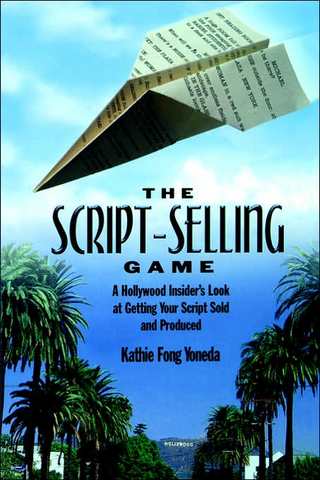
Watch the video interview on Youtube here
Film Courage: I’ve been reading this book called LOL [LOL: From Homeless to Multimillion-dollar Global Business Leader] The writer is Christy Dreiling. It’s about her life growing up impoverished and then she became a multi-million dollar salesperson and vice-president of a company. She talked about what she learned was the poverty mentality versus people who break out of that, which [comes from] a willingness to find a solution. That people who stay in a poverty mentality, don’t [find a solution] and those who break out, they find solutions. They have a problem, they find a solution. That being said, people creating opportunities for themselves, in Los Angeles as a writer. It doesn’t even have to be in LA. But those who don’t and say “I don’t know what to do? I’ve been submitting [and nothing].” Whatever, versus those who find a way out of that problem. What have you noticed?
Kathie Fong Yoneda: Well I think what you are saying is true. Let’s face it, we can’t have it all! We can’t be perfect in every single area. And I think one of the things you were talking about earlier, we were talking about how there are differences in how things are done in the industry now. And one of the things is there are a lot more people who are in career counseling as consultants. And sometimes when you get stuck and especially with writers are so internal about how they process things and sometimes it’s hard to be external and get things out there and to do it the right way.
I know that there are people who are career counselors who have really helped in that area. They talk to you and try to find out what it is about you that is special and what is it about your writing that is meaningful and they try to bring that out of you and for you to try to use that and to help you with your work. And I think that this is something that writers can look into. Not just writers, but I know actors and actresses have to go to career coaches to help them out with that.
You would think with actors and actresses that they would be very external and very ‘out there.’ But a lot of actors and actresses that I’ve met, there’s a lot of self-doubt sometimes behind them. And so every once and a while, they get stuck and they sometimes go to career coaches to help them out. So there are career coaches who are specialists in terms of writing.
Film Courage: Let’s say somebody at this point can’t afford that. What are some other things people can do to create an opportunity for themselves? Sounds like a writing group or any type of creative group?
Kathie Fong Yoneda: A writing group is wonderful. The more people you communicate with who are doing the same thing you are doing means more opportunities because I’ve noticed that if one person finds a little bit of success, they are willing to share it. Like if they can get an agent or if they get a producer to read their material, they are then ready to say “Oh? Well, maybe then I can help this person who has a project that maybe that producer is looking for.”
As I mentioned earlier, that’s what happened to one of my clients when she was in a writer’s group. So I think that really does help. I also think that if you go to different (in terms of networking) networking groups that they have here in LA. There is one that is the first Friday of each month and I think it is called First Friday or something? But they have a group where people get together and they will say we are meeting at such and such (and usually it’s a cocktail bar or some group or restaurant). And a lot of times there are other writers there. There are also other writers who have made it, who were in that group who sometimes come. There are things like that.
Somebody else I know said that when they first moved here, they knew no one. What they did was they Googled “Screenwriter Meetup” and they came up with a list of things and she went to every single one of those. She formed her own writer’s group from the people who were of interest to her that she felt she made a connection with.
She now has a lot of friends. She came knowing no one. She’s from North Dakota. And she said there was nobody in her town. She put up a little thing saying “Any screenwriters?” She put it up at the local University in her town. And there is nobody there who said anything about “Yeah, they are interested in screenwriting.” So she said “I guess I need to move to California.” And so she just took a leap of faith and she did that. I mean it doesn’t work for everybody but it sure worked for her. She now has an agent, she’s been doing punch-ups. She’s a great comedy writer. And so she’s been doing punch-ups and she’s been doing some stuff for late night comedy work to do writing there.
It’s kind of interesting to see how people start to make slow progress just by the connections that they are making.
Film Courage: I think we all know someone who has great intentions but they just kind of wait for emails, they wait by the phone and they don’t do anything about it. What have you seen in that sort of type that gets them out where they can stop waiting and relying on someone else and making opportunities. Like the woman who started her own Meetup group, which is an excellent idea. But that’s kind of scary? That takes a leap of…I mean I get it, she knew some of the people [previously] but that’s intimidating? What do you see?
Kathie Fong Yoneda: She told me the most intimidating thing was moving from North Dakota to California.
Film Courage: Sure, that’s scary in itself.
Kathie Fong Yoneda: It was scary, but she told me if she could do that, she had nothing to lose. She looked at it like when she went to these Meetup groups, she knew nobody. She had nothing to lose and everything to gain. And I think a lot of it is your attitude when you come in. If you are looking for something and you really want it, you make the effort to let somebody get to know you better. And it does, it takes a huge leap of faith.
But it’s worthwhile in the long run for people who do put themselves out there. It’s not easy but you have to do that. There are a lot of people who just give up. And if they give up, to me it means it wasn’t meant for you. But if you stick with it, something is eventually going to happen.

Watch the video interview on Youtube here
Like I told you, I interviewed over 200 of these people who are professional writers. The average was 8 scripts. There was one guy who is now on staff on television. He’s a really good television writer. And I asked him “Well, gosh? How does it feel?” You know how many scripts it took him? It took him 12 scripts. And I said “Well what did you do when you reached 8 scripts?” And he said “I don’t know. There was just something about…I could not stop. It became like “I’m going to do this” And he just had to do it. And he kept writing and writing and he finally got to that 12th script and I said “Gee, I’d like to read some of those first 10 scripts.” And he said “No…I don’t think you want to.” And I said “Yeah, but I’d like to see what they were like.” And he said “You know what, I don’t let anybody read them.” And I said “Well do you still have them?” And he said “Yeah, I have them in a drawer at the bottom of my desk.” And I said “Well, why are you keeping them then?” And he said “It’s to keep me humble. Because how could I even think? I look at those 10 and say how could I even think I was a writer when I read those 10 scripts?” I mean it just amazed me! And this guy is quite successful. I mean, he makes 6 figures a year as a writer and he’s doing quite well, but it took him that long.
And so you have to have that determination, you just have to have to do it. You can’t just say “Oh, well. It’s not going to happen.” It’s like…I always tell people…it’s like you’re knocking at Hollywood’s door. They ain’t going to answer…you are not going to open that door if you don’t give them the answers or if you don’t tell them what it is that you want. And it’s not just what you want, you have to show them what you have. So want and have are two different things. You know, you can dream about it, but you have to make the dream come true. Dreaming about it and not doing anything about it, that’s the difference between success and failure.
And some of the people who I’ve seen that I’ve known for years who are doing quite well in the business, it’s because they deserved it, they really stuck to it. They just couldn’t help themselves. They just had to keep writing. And they believed in themselves that they said “I’ve just got to do this.” A lot of times they had to take two or three jobs in order to do it. A lot of times family and marriage came and went in between all of that because I asked one of them one time…his wife was a teacher and they had twins and so he had to be the one to stay home with the twins, which is not easy. And I asked him “How did you do it and get your assignments in on time?” And he said he basically had to stay up at night. He would set the alarm, he would go to sleep at 10 o’clock, he would get up at 3 o’clock in the morning, do the feeding, and then he would work for three hours straight. And he gave himself that he would have to write so many words or how many scenes or whatever it is and that’s how he did it. He just stuck to it. And he said there were times where he would just sit there and he would be waiting and waiting for those words to just come and they wouldn’t. And he finally just started writing down just random words and pretty soon (he said) he would just come across something. It was like “Oh, wait a minute? That word.” And pretty soon it would start to flow. And he said he doesn’t understand it to this day, he just knows it happened. And he said that’s what he did but he always made sure even in those times when he felt like he couldn’t do it, if he wasn’t going to write he was going to sit there and stare at the page and just write random words until something came to him. Because he felt he had to at least psychically be doing it, or psychically typing it up for him to be able to feel that “Okay, even if I am not sitting here with an idea, I’m just going to keep typing until something strikes me.” That’s literally how he said he got some of his assignments done. Some of it was trash, you know. He would type for an hour and nothing would come up and then all of the sudden something would click. So I think he just felt that he had to do it, he forced himself to do it. It worked for him and he had the weirdest hours but it worked for him.
Question for the Viewers: Will you continue to write even if you never become a professional?

CONNECT WITH KATHIE FONG YONEDA
KathieFongYoneda.com
ABOUT KATHIE:
With over 25 years of industry experience, Kathie Fong Yoneda has worked for such prestigious studios as Paramount, Columbia, MGM, Universal, 20th Century Fox, and Disney, specializing in story analysis and development of live action and animated projects. Her career includes executive positions with Walt Disney, Touchstone, Island Pictures and Walt Disney TV Animation where she has evaluated more than 18,000 submissions (Read more here).




























